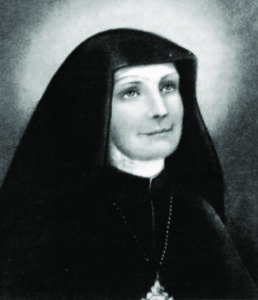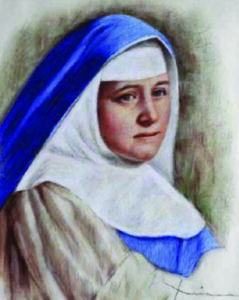December Saints
St Vicenta María López y Vicuña
(1847-1890)
Holy people are not so detached from the world as to be unable to appreciate the difficulties other folk face in their efforts to survive, to earn a living and at the same time to save their souls. Many now ranked among the canonised dedicated themselves to particular classes of the people of God in order to bring them to the Kingdom.
St Vicenta María was born at Cascante, in Navarre, in 1847 to devout middle-class parents. In 1854 her parents sent her to Madrid for schooling. She lived with her aunt, Eulalia de Vicuna, and this admirable woman set her an example that shaped her whole adult life and her growth in holiness.
Eulalia had already established a hospice for jobless young servant girls. Vincenta, attracted by this sort of charity and realising its necessity, worried what would become of it if something happened to her aunt. At age 19, feeling a call to an active apostolate, she took a private vow not to marry. Her parents were not pleased. They wanted her either to marry or to join a cloistered order. When she refused, they ordered her home. Back in Cascante, Vincentia’s health caused such worry that she was allowed to return to Madrid.
In 1871, Vincenta, her aunt and a few other women on the hospice staff began to lead a community religious life. Five years later, they drew up a rule of life that would commit them to conducting homes for working girls and teaching them domestic arts. So it was that the Daughters of Mary Immaculate for Domestic Service was founded.
The work expanded to include further homes, hostels, technical schools, and canteens in several countries. Aunt Eulalia continued to contribute her whole time and fortune. But Mother Vincenta’s financing plan positively excluded operating regular schools to obtain funds for their charitable work. She chose the harder way – begging. The Sisters had an unofficial motto: “Steady employment is the safeguard of virtue”. In this spirit they carried on their work.
The task Vincenta undertook was not easy. Not only were finances a problem. Her own health was always poor, and she was only 43 when she died. But she would not have chosen any other role. “I count myself happier in the service of these my sisters”, she said, “than the great ones of this world in the service of their lords and kings”.
Pope Paul VI canonised this modern woman in 1975. She is an exemplar of social charity for our times.
Saint Vincenta, may your example arouse in us a true spirit of service to others.
Source: Internet: various
St María del Carmen
(1848-1911)
María del Carmen Sallés y Barangueras was born in Barcelona on 9 April 1848 the second of ten children.
In 1858 she travelled to Montserrat on a pilgrimage together with her parents and it was during this trip that she decided to devote her life to God, a desire which was augmented following the reception of her First Communion.
Later in 1864 she announced her desire to become a nun and managed to convince her pious parents to break off an arranged marriage to which she had been committed. It was not long after this that she began her path of service when she joined the Sister Adorers of the Blessed Sacrament, starting her novitiate period in Barcelona in May 1869. Her work during this time, and for the next two decades, focused on helping with the rehabilitation of women who had fallen victim to lives of prostitution or other crimes.
Her time with the Sister Adorers came to an end in 1870 when she decided to join the Dominicans of the Annunciation, where she made her final vows in August 1872.
In 1892 María left the order with three others and later founded the Conceptionist Mission Sisters of Education in Burgos on 22 February 1892, which focused on influencing societal norms in a positive manner and educating girls in order to prevent them from turning to prostitution. The group received the decree of praise from Pope Pius X in September 1908 and papal approval in full from Pope Pius XII in December 1954.
María died in 1911 in Madrid.
Saint María, teach us to look out for and support women living in situations of moral difficulty.
Source: wikipedia


 Entries(RSS)
Entries(RSS)